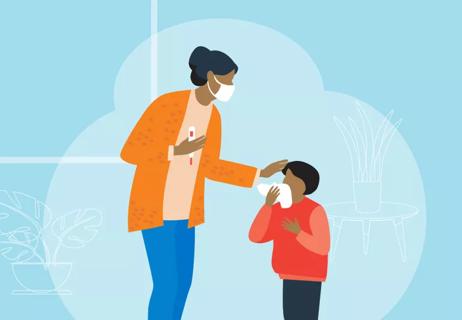When your body is fighting infection, your internal temperature rises as a defensive response

Most of us associate a fever with someone touching our forehead and saying: “You’re feeling a little warm.”
Advertisement
Cleveland Clinic is a non-profit academic medical center. Advertising on our site helps support our mission. We do not endorse non-Cleveland Clinic products or services. Policy
Medically speaking, a fever is measured by temperature: specifically, 100.4 degrees Fahrenheit (38 degrees Celsius) or higher. This happens not because of the infection or virus. Rather, because the virus or bacteria is seen as an attack, which triggers a response from your body’s immune system.
“We tend to think of a fever as something bad that we want to bring down — it’s very uncomfortable. But the funny thing is, it’s our own body starting to fight off what’s invading us,” explains family medicine specialist John Hanicak, MD.
Here, Dr. Hanicak breaks down exactly what happens to your body when you have a fever, and how to find relief.
When you have a fever, warming up is your body’s natural response to fighting a virus. Think of it like a fire alarm that goes off when there’s a sign of smoke. Normally, your body temperature is around 98.6 F (37 C). When it hits 100.4 F (38 C) or higher, it’s signaling that something is wrong.
“If a virus gets into our system, it’s in the mucus membranes and it starts to show up in the bloodstream,” says Dr. Hanicak. “Then, our immune system releases inflammatory chemicals that increase our core temperature.
“That higher temperature makes it very uncomfortable for the virus to live. Your body is literally trying to cook the virus out.”
Advertisement
Some other things that happen when you have a fever:
There are different types of fevers that tell us the severity of the infection. If your temperature goes slightly above the normal range, it’s not always a cause for concern.
A low-grade fever is between 99 F and 100.9 F ( 37.2C to 38.3 C). “What we call a low-grade fever may actually represent a different set of illnesses than something that gives a high fever,” clarifies Dr. Hanicak.
You can get a low-grade fever with any virus, as well as other issues like an ear infection or strep throat. The symptoms of a low-grade fever are typically on the milder side, like slight fatigue, headache and/or chills.
On the other hand, a high fever is usually a sign of a more serious infection or inflammatory condition. A high-grade fever is 103 F (29.4 C) or higher. It can be seen with something like influenza (the flu), pneumonia or COVID-19.
With a high fever, you may feel symptoms like severe chills, confusion, rapid breathing and increased heart rate.
This is when you should seek medical attention if the temperature doesn’t go down within a day or two.
According to Dr. Hanicak, you don’t always have to get rid of a fever because it’s a natural part of our immune response. But that doesn’t make it any less uncomfortable to deal with. If the fever is making you very uncomfortable, then it is worth treating.
“At that point, the goal is to get more comfortable so you’re not losing as much fluid and can sleep and rest and, therefore, get better faster,” he adds.
Here’s what he recommends:
Advertisement
How do you know when to go to the doctor? Dr. Hanicak says that if your temperature is below 100.4 F, you’re probably OK. But you should see a healthcare provider if you’re experiencing:
Advertisement

Sign up for our Health Essentials emails for expert guidance on nutrition, fitness, sleep, skin care and more.
Learn more about our editorial process.
Advertisement

Any fever, especially one of 100.5 degrees Fahrenheit or higher, should trigger a call to your oncologist — and maybe a trip to the ER

A combination of rest, fluids and over-the-counter medications can help you feel better fast

Most cases are mild and can be treated at home, but some situations may require medical care or a trip to the ER

It can cause alcohol poisoning and other serious health issues, especially in kids

It’s important not to give them fever-reducing medications right off the bat

Is it just a passing chill or something more serious?

What you need to know about these common misconceptions

Even small moments of time outdoors can help reduce stress, boost mood and restore a sense of calm

A correct prescription helps your eyes see clearly — but as natural changes occur, you may need stronger or different eyeglasses

Both are medical emergencies, but they are very distinct events with different causes